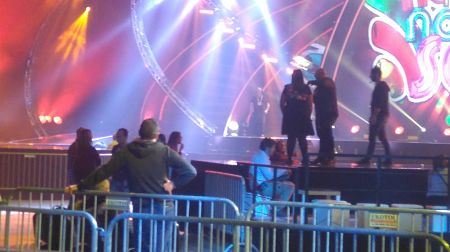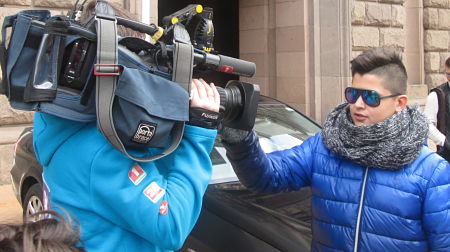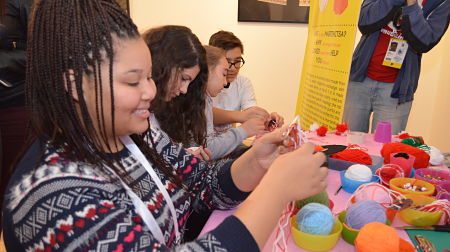Representing your country in an international prime-time event can put pressure on even the most level-headed of performers. When those performers are children the fear is that the pressure might just get to be too much. In an effort to get inside this perception ESC Insight’s Ben Robertson was tasked with following Malta’s representative for Junior Eurovision 2015, Destiny Chukunyere, for one day away from the arena. Is the experience children have in Junior Eurovision a magical utopian paradise or lurking beneath is there a darker side to the competition?
I was told to meet the Maltese team at their official hotel at nine o’clock, as I joined the team on their excursion for the day. I explained that as much as possible I wanted the fly-on-the-wall experience, to just observe what the delegation goes through behind the scenes. That wasn’t a problem, but the team made sure to ask Destiny first to make sure she was cool with it. She had to have control and be comfortable after all.
When I arrived at the hotel lobby there was already a Junior Eurovision buzz around. MIKA from Armenia was on his iPad playing a racing game while his female dancers collectively tried to distract him; meanwhile Serbia’s Lena Stamenkovic demonstrated her fantastic piano skills. Destiny herself was lounged on the armchair taking a couple of selfies, the epitome of a chilled out teenage girl.
I was greeted by the Maltese delegation and merrily welcomed into the fold. The delegation comprises Destiny herself, Head of Delegation, Head of Press, Vocal Coach, Choreographer, Composer, Lyricist and, most importantly, mum. It’s easy to say but it’s just like a little family, all knowing each other really well and making up a wonderful team. As we headed off on our trip Destiny strides in front and clambers straight to the back corner of the bus, and all of us simply followed suit. It’s clear Destiny was the boss, even when she drifted into a slumber as soon as the journey began.

Destiny on stage during rehearsals with composer Elton Zarb with the Maltese delegation looking on (Photo: Ben Robertson)
Making Friends In The Bubble
The destination is the Sofia History Museum located in the middle of town. We’re joined by other delegations as the teams from Belarus, Armenia, Albania and hosts Bulgaria all assemble outside together in a big huddle. The whole experience resembled something along the lines of a glorified school trip as we slowly snaked our way across the car park into the museum itself.
On the way it was incredibly reassuring to note that those bonds had been made already between delegations. The artists from Armenia and Belarus, MIKA and Ruslan respectively appear to be turning into the Junior Eurovision equivalent of Måns Zelmerlöw and Guy Sebastian. The bromance between the two Russian-speaking acts was heartwarming, as was Destiny’s huge warm hug with Mishela from Albania as they spot each other arriving.

Ruslan Aslanov doing a quick piece to Belarussian TV on his way to the Sofia History Museum (photo: Ben Robertson)
The Maltese delegation told me how important it is to get this kind of connection. The day before we met they did a few rehearsals after dinner with Destiny just to run through the performance of ‘Not My Soul’ again, but insisted they stopped and went down to the EuroClub to have a good time. “The children need to enjoy it” was the phrase echoed over and over again.
Once inside the History Museum we were cramped in the entranceway for a folk costume melee which culminated in the artists being offered the traditional Bulgarian welcome of bread and honey. With local festivities complete the lovely volunteers attempted to scramble everybody up the stairs to the second floor where little craft workshops were prepared. Overall I felt the felting, colouring in and mask making choices were a little too infantile for the mature artists we have in Junior Eurovision this year, but it did the job of taking their mind off the rest of the bubble. Destiny had a blast chatting away to the different volunteers who helped her create a felt sun design and traditional Bulgarian flowers while seeming at ease posing for photos afterwards. Not once did anybody plant the reminder that there’s a huge competition coming up on Saturday night.
The Pace Of Junior Eurovision
As we sauntered back to the buses to grab some lunch, Destiny had a quiet word with her team and decided that she wanted to do some extra rehearsals before eating. The team said that was fine and mum, dance teacher and vocal coach stayed back in the hotel. What was amazing about that this was Destiny wanting to do the extra work, the extra practice, and if there was any pressure it was healthy and coming from her.
Her team were making sure the pace was very gentle and there was no rush to do anything whatsoever. While they rehearsed the rest of us went out for lunch on Sofia’s main boulevard and the delegation spoke at length about Malta’s passion for Junior Eurovision. Malta have very clearly indicated a desire to win Junior Eurovision again and very likely host again given any opportunity to do so following the success of last year. Yet that wish isn’t one imposed upon their artists, there simply isn’t the pressure that the 1st and 4th places from the last two years might incur.
When I ask what the atmosphere is like in the main Eurovision Song Contest it’s clearly the two are incomparable. For a country like Malta everybody agreed that there isn’t any sense of relief until they have secured that slot in the Grand Final, and here at Junior Eurovision the final result is of little direct importance. The result of this is that the team feel they can take a leisurely two hour lunch talking to me about the finer details of the Contest in all its forms, and comparing how in Vienna they were running to Burger King each day to rapidly refuel.

Artists in the Eurovision Song Contest, like Amber representing Malta in 2015, are far busier than the children competing in Junior Eurovision (Photo: Derek Sillerud)
Junior Eurovision doesn’t inflict that fast and frantic pace on the acts. Each day of the week does involve something to wake up for, be it rehearsals and interviews in the Press Centre or alternatively some of these trips out provided by the local tourism board (later in the week Destiny at the team will visit Muzeiko, the newly built Science Museum in Sofia). But the days are not long and everybody is able to get plenty of rest and relaxation.
The Safe Space Of Junior Eurovision
In this experience the aim was to get the full insight in what the life is like for a Junior Eurovision artist as they prepare for the biggest performance of their life. The words I would use to describe the artist experience include gentle, calm, relaxed, fun, child-centred, inclusive, flexible and the list of nice adjectives could continue ad infinitum.
It’s important to remember that Junior Eurovision has its Code of Ethical Conduct which all delegations, organisers and press must adhere to. The children need to have ‘their best interests considered’ and are ‘protected from any inappropriate or unreasonable demands’. Throughout this day out I couldn’t see a single ounce of worry that these requirements were not being met. Destiny was the one in control of all the different parts of the day and no-one on her team even hinted at putting any demands on her at all. I can say the same for all the different delegations that I saw around with us as well.

Destiny and other children in Junior Eurovision 2015 keeping themselves occupied at the Sofia History Museum (photo: Daniel d’Anastasi, PBS)
Junior Eurovision is safe. Delegations are conscious that they want to protect the children and produce an environment conducive to calm. Artists seem happy to listen to the experts in their team but also are the ones in control of their own destinies. The organisers are ensuring there is a varied social program which gives the artists the chance to interact with each other, take their mind off the competition at hand and build the chance to make new friends.
I went looking behind the scenes to see if there was anything in the Junior Eurovision bubble that would made me feel uneasy. I couldn’t find anything to be worried about. The artists, simply, are having the time of their lives.









This is so lovely. And true. You really do ‘get’ it, Ben!